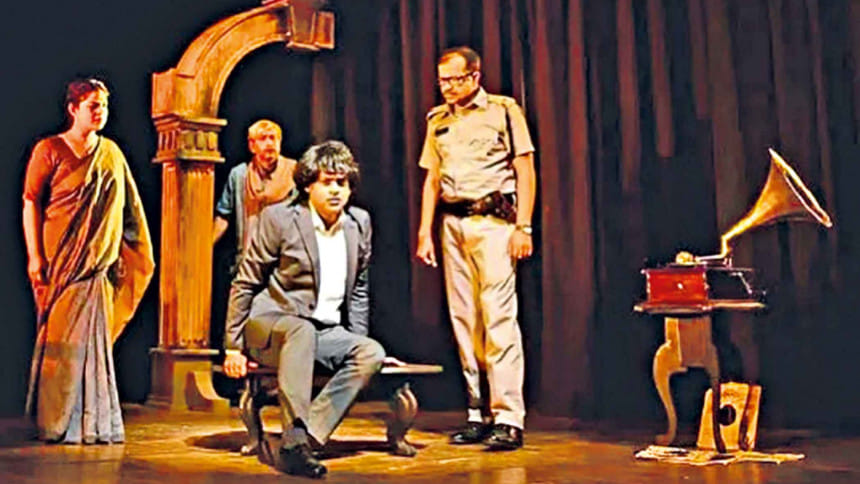Dramangle: The best that theatre had to offer in 2020

2020 was not a very eventful year for live theatre, as the world of performances, where social mingling is one of the prime cultures, was viciously invaded by the Covid-19 pandemic. The situation was no different in Bangladesh too—in fact, the world of theatre last year underwent a kind of hibernation, and theatre activists are not very optimistically animated about 2021 either, though they have firm faith in the maxim: The show must go on.

In Bangladesh, in spite of strict social distancing, there had been multiple online performances by a number of theatre groups until early October 2020. In Dhaka from mid-October, the Bangladesh Shilpakala Academy National Theatre Hall, along with a few other theatrical auditoriums, were opened for theatre groups austerely, maintaining all health and hygiene protocols. Subsequently, a flood gate of enthusiasm overwhelmed, denoting that this particular art, despite many stumbles across centuries of its existence, is destined to survive.
Though 2020 was a barren year for performing arts all over the world, in Dhaka, things appeared to be quite productive at the fag end, as six new plays came on to the stage in the months of October and December: "Ekti Loukik Othoba Oloukik Steamer", "Mulya Omulya", "Paake Bipaake", "Major", "Objection Overruled", and "4.48 Montrash".
"Ekti Loukik Othoba Oloukik Steamer", produced by Dhaka Theater, written by Anan Zaman, and directed by Shahiduzzaman Selim, exemplified a perpetual theatrical journey during the pandemic, as accentuated by Nasiruddin Yusuf Bacchu, the founder high patron of the group. In the play, the Steamer symbolises the marker of emancipation for all of us during this deadly pandemic. "Mulya Omulya"is an adaptation by Ashit Mukhopadhya from one of Arthur Miller's famous plays "The Price"that deals with the onslaught of profiteering mechanism sponsored by the state and society, and free economy, and their trickledown collective impact on joint families. The play is directed by Mohammad Bari under the banner of the group, Onuswar.
"Paake Bipaake", written by Monoj Mitra, is a theatrical production by Padatik.Though the storyline dwells upon that agelong linear theme of exploiter and exploited tension, the fact is it has not lost its relevance even in the 21st century. Shanjib Kumar Dey did the directorial work for the play. Major happens to be a collaborative production of two theatre groups—Shobdo Natya Chorcha Kendro and Prangonemore Natyadal. The play is restructured and directed by Ananta Hira from its original "Mriter Atmahotya" written by the reputed literature and academic late Abul Fazal. The theme is based on post-liberation volatile state-of-affairs after the heinous killing of Bangabandhu.
As for Objection Overruled, it is a feminist play with the distressing and troubling anecdotes of an Iranian woman named Rehane Jabir. The play is produced by Anurag Theater and written and directed by Mahbub Alam.
Noticeable, I have saved one particular play, 4.48 Montrash, that needs a special mention. It is a play directed by Syed Jamil Ahmed, a theatre activist, director, academic and scholar, who is equally praised and criticised after every single theatrical production of his, and this one is no exception. The play he directed this time is originally written by an English playwright Sarah Kane titled "4.48 Psychosis", translated by Shahman Moishan and Sharif Shiraj. Sarah suffered from psychotic disorders with symptoms of delusions and hallucinations most of which she depicted in all her five plays before she committed suicide in 1999, and "4.48 Psychosis"was her last play—the title of which originates from the time she felt depressed and often woke. The content of the play suited Jamil's line of directorial philosophy quite well, for it has no overt storyline, definite number of characters or any stage directions.

Jamil, in recent days, is much more leaned towards narrative devices wherein story unfolds abstractly and many dramatis personae speak directly to the audience, breaking the fourth wall conventionally defined by Konstantin Stanislavski. It is today's top trending theatre practice.
Intriguingly enough, many of the audiences at Mahila Samity, where it ran for two weeks at a stretch in December, felt exactly like what Sarah's critics wrote,
"How on earth do you award aesthetic points to a 75-minute suicide note"; or "it is impossible not to view it as a deeply personal howl of pain". Though Syed Jamil Ahmed has tried to draw a parallel between the causes of the psychotic condition of the lead female character and that of ours in Bangladesh, I have a feeling most of the audiences felt quite distanced from the ultimate message of the play. Either Jamil is a prisoner of his own ego, or he is ahead of our time.
The writer is a translator, playwright and an academic. Email him at: [email protected].

 For all latest news, follow The Daily Star's Google News channel.
For all latest news, follow The Daily Star's Google News channel. 



Comments